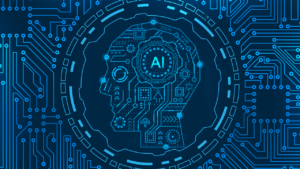Most often when people discuss artificial intelligence (AI), they are discussing a subset of that field known as machine learning. Louis Columbus (@LouisColumbus) explains, “Enterprises are striving to find greater meaning in the massive amounts of data they generate and save every day. Machine learning is providing the needed algorithms, applications, and frameworks to bring greater predictive accuracy and value to enterprises’ data sets and contributing to diverse strategies succeeding.”[1] Dr. Nipa Basu (@nipabasu), Chief Analytics Officer at Dun & Bradstreet, adds, “Machine learning is changing the way businesses look at data and presenting new analytics opportunities for companies of all sizes. Increasingly, how organizations leverage new technology for machine learning in business will be a key deciding factor in whether they can ride the waves of change or find themselves washed up on the data analytics shore.”[2]
Machine learning and the business of tomorrow
Although many organizations are already using machine learning successfully, most organizations are just getting started and few of them have mastered how to apply machine learning to pressing business challenges. Lindsay Clark reports, “According to an O’Reilly survey of 11,400 data science experts, nearly half (49%) of organizations are at the early stages of adopting machine learning. Only 15% consider themselves sophisticated users of the statistical techniques expected to make such a big impact on business. But even those with considerable experience in machine learning are still developing their understanding of how to apply it to real-world problems at a scale that benefits the business.”[3] Although machine learning can be leveraged throughout a business, most of the focus today is on learning more about consumer behavior. Most consumers are aware data is constantly being collected about them as they use their digital devices and this data can be used for marketing purposes. Craig Boyle explains, “This degree of personalization can be intrusive, but it can also be very useful. In a world where habits shape 45% of the choices we make, behavioral research and predictive analytics are gold-dust for businesses.”[4] He continues, “If you’re setting up a business, the world of machine learning and algorithmic AI allows you to tap into vast knowledge. You can use data gathered from user behavior and purchases to predict how they may act in the future or tailor marketing efforts to their likes, dislikes and buying habits.”
Machine learning and the supply chain
Machine learning can prove useful all along the supply chain from procurement to production to marketing to after sales support. Columbus asserts, “Machine learning makes it possible to discover patterns in supply chain data by relying on algorithms that quickly pinpoint the most influential factors to a supply networks’ success, while constantly learning in the process.”[5] The potential uses of machine learning in the supply chain are only limited by one’s imagination. As Columbus notes, machine learning is ideal for discovering patterns. These patterns can be useful in all sorts of situations. For example, monitoring vital equipment over time allows machine learning to identify patterns of performance that can predict when a machine is about to fail. Or as Boyle noted, machine learning can be used to predict consumer behavior. “Discovering new patterns in supply chain data,” Columbus insists, “has the potential to revolutionize any business.” He goes on to list ten ways machine learning is revolutionizing supply chain management. They are:
1. Demand forecasting. “Machine learning algorithms and the apps running them are capable of analyzing large, diverse data sets fast, improving demand forecasting accuracy.”
2. Improved performance. “Reducing freight costs, improving supplier delivery performance, and minimizing supplier risk are three of the many benefits machine learning is providing in collaborative supply chain networks.”
3. Actionable insights. “Machine Learning and its core constructs are ideally suited for providing insights into improving supply chain management performance not available from previous technologies.”
4. Pattern recognition. “Machine learning excels at visual pattern recognition, opening up many potential applications in physical inspection and maintenance of physical assets across an entire supply chain network.”
5. Greater efficiency. “Gaining greater contextual intelligence using machine learning combined with related technologies across supply chain operations translates into lower inventory and operations costs and quicker response times to customers.”
6. New business opportunities. “Forecasting demand for new products including the causal factors that most drive new sales is an area machine learning is being applied to today with strong results.”
7. Preventive maintenance. “Companies are extending the life of key supply chain assets including machinery, engines, transportation and warehouse equipment by finding new patterns in usage data collected via IoT sensors.”
8. Risk management. “Improving supplier quality management and compliance by finding patterns in suppliers’ quality levels and creating track-and-trace data hierarchies for each supplier, unassisted.”
9. Optimization. “Machine learning is improving production planning and factory scheduling accuracy by taking into account multiple constraints and optimizing for each.”
10. Visibility. “Combining machine learning with advanced analytics, IoT sensors, and real-time monitoring is providing end-to-end visibility across many supply chains for the first time.”
Bernard Marr (@BernardMarr) notes, “Supply chain efficiency is essential. Inventory management, picking, packing and shipping are all time and resource-intensive processes which can have a dramatic impact on a business’s bottom line.”[6] For that reason, he agrees with other experts cited in this article about the importance of machine learning for the business of tomorrow. He explains, “Creating efficiencies in complex systems which involve multiple, often compartmentalized processes is an area where this technology excels. In short, it’s about the ability of machines to make lots of little savings and efficiencies, which together add up to very large ones.”
Concluding thoughts
Machine learning is all about algorithms. Various business challenges may require different algorithms to gain desired insights. To ensure the right model is used, my company, Enterra Solutions®, leverages the Representational Learning Machine™ (RLM) created by Massive Dynamics™. The RLM can help determine what type of analysis is best-suited for the data involved in a high-dimensional environment. Basu insists, “The first step toward successfully embracing machine learning as an instrument of business improvement is to clearly define what you want to do better.” Columbus adds, “From weather forecasting to optimizing a supply chain network using advanced simulation techniques that generate terabytes of data, the ability to fine-tune forecasts and attain greater optimizing is … driving machine learning adoption.” Marr concludes, “Going forward … machine learning is only going to play an increasingly prominent role in supply chain optimization.”
Footnotes
[1] Louis Columbus, “Machine Learning Is Becoming A Growth Catalyst In The Enterprise,” Information Management, 7 June 2016.
[2] Nipa Basu, “3 ways to make machine learning in business more effective,” TechTarget, October 2018.
[3] Lindsay Clark, “Making machine learning fit for business,” IDG Connect, 15 January 2019.
[4] Craig Boyle, “Machine learning, AI and digital intelligence’s effect on business,” Tech Guru Daily, 24 March 2016.
[5] Louis Columbus, “10 Ways Machine Learning Is Revolutionizing Supply Chain Management,” Forbes, 11 June 2018.
[6] Bernard Marr, “Predictive Analytics And Machine Learning AI In The Retail Supply Chain,” Forbes, 12 September 2017.





